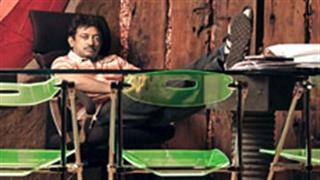"I'm happy to see I've been appreciated. I did it because it was challenging. I'm happy audiences understood what the film is really about. That's contrary to how some people in the film trade saw it from the outset... not a single person has disliked it. I've got positive feedback from weird places," Amitabh told in an interview.
The veteran actor pointed out that "Nishabd" was shot in a remote location, away from crowds, which enabled him to perform well. He also stressed that Varma gave ample space to all his artistes.
"There were no crowds, no phones, no connection with the rest of the world. It was just us and the project. It was the silence that stimulated creativity."
Excerpts from the interview:
Q. "Nishabd" has triggered off a lot of debate.
A. I'm happy to see I've been appreciated. I did it because it was challenging. I'm happy audiences understood what the film is really about. That's contrary to how some people in the film trade saw it from the outset. Ramu now feels the projection of the film's publicity was wrong. But not a single person has disliked it. I've got positive feedback from weird places.
The point of the film is what does a man in that situation (of falling for a much younger girl) do? It's not about how can he or why did he? I think the ethical speculation is a hypocritical excuse for puerile thoughts. Some people have challenged the wisdom of the character...as though wisdom and age are inherently linked together. They're not! Wisdom doesn't come automatically with age.
Q. You've once again stunned audiences in "Nishabd".
A. Given an opportunity and a competent director, it's possible. One reason why it happened was because we went to a remote place and shot the film at a stretch. There were no crowds, no phones, no connection with the rest of the world. It was just us and the project. It was the silence that stimulated creativity. We've forgotten the value of silences.
The moment the camera goes on, the actor craves for solitude. Most of the time we're so crowded we don't do our best work. Everything came together in "Nishabd". I just love the time that Ramu gave to my close-up after my character asks the girl to leave. Ramu just lets the moment linger on. He gives space to all artistes.
 Q. Like "Black", your performance in "Nishabd" is born without reference points.
Q. Like "Black", your performance in "Nishabd" is born without reference points.A. Sanjay Leela Bhansali ("Black" director) gave me huge moments of space. Sometimes during shooting the film ran out or the video monitor broke down. But he didn't stop me. He just allowed me to keep going.
At the end of the shot he'd ask me to do it again. Not once did he rush me. I could easily make out when Sanjay was happy and when he was very happy. I was never content with him just being happy.
I remember one sequence where the girl Michelle says 'mother' for the first time and my character sits at the water fountain and starts talking...Sanjay had the camera very close to me. I asked him to take the camera back. Suddenly I didn't feel crowded while breaking down.
Sometimes you get very conscious when dozens of people are watching you. Suddenly when the camera and the unit move back you get the physical space to let your true emotions come out. I felt these true emotions come out in "Black" and "Nishabd".
Q. Would you say these two are your finest films in recent times?
A. I'm fortunate such roles are coming my way. These two films gave me the opportunity to delve into the darker areas of my personality. Some of my forthcoming films also give me that opportunity.


















